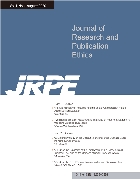- 권한신청
- E-ISSN2733-7146
- KCI Candidate
3권 2호
초록
Abstract
Purpose: Various ethical issues arise in different stages of management and business marketing research. The current study aims to take look at practices that ensure informed consent, privacy and confidentiality, deception, and legal aspect in data management in procedures involved in marketing research. Research design, data and methodology: Literature content analysis was conducted for this research and the current author has investigated journal articles mostly to guarantee a high degree of content validity and to keep the advantages of qualitative content approach. The current study explores manifest topics regarding the ethical issues of business marketing research. Results: The current study found that ethical consideration needs to be similarly significant and learning from the previous researchers' approach to handling this issue is helpful for future research and is essential to have additional guidelines. Also, four findings (Lack of Informed Consent, Deception, Invasion of Privacy and Confidentiality, and Legal Data Management) indicate that marketing researchers need to consider before undertaking any project. Conclusions: Overall, the study presents practical suggestions though unexhausted. By raising these ethical marketing issues, consumer behavior disciplines will continue to expand and contribute positively towards attaining thoughts, feelings, and decisions that positively contribute to marketing research as the foundation for effective marking practices.
초록
Abstract
Purpose: For several decades, there has been a variety of publications on refugee and enforced immigration studies, with the rising corpus of studies on obligatory displacement and sport reflecting relatively recent emphasis over the last decade. However, prior studies do not suggest and summarize regarding ethical perspectives in terms of participatory behavior of refugee youth in sports and leisure field. Research design, data and methodology: Unlike quantitative research method which tries to quantify the association between variables, the qualitative research design that was selected by the current study as a main methodology attempts to take a look at the current and past literature contents closely so that obtained datasets may be explanatory and abundant. Results: After thorough analysis, it was evident that in all research where ethical perspectives were utilized, there was increased participation in sports and leisure activities by the refugee youths, and it may be divided into three categories: culturally sensitive, contextual, and reflective ethics. Conclusions: The current research concludes that ethical perspectives are required to research refugee youth's participatory behavior in sports and leisure and many more ethical factors are aspired to, and they must be thoroughly evaluated before, throughout, and following the study.
초록
Abstract
Purpose: Environmental education-research mainly focuses on the relationship between people and the environment. The purpose of this study is to focus on elaborating on the various ethical behaviors crucial in environmental education-related research. The study utilized a literature review of initial studies conducted on the topic as the primary source of information. Research design, data and methodology: This study has selected the literature content analysis as a research design because this analysis tool provided the present author numerous and tremendous previous works in the realm of authors' ethical issues within environmental education area and prior research already confirmed the high quality of an instrument. Results: Based on the investigation of the literature analysis, the findings emphasize that, while making any choice regarding environmental studies and research, authors and researchers must consider how ethical behavior might be applied to the particular circumstance. There are three ethical behaviors for authors and they can be founded in the section 3 of this study. Conclusions: As a conclusion of this study, three major subfields of environmental ethics-resource ethics, animal ethics, and ethics of nature protection-serve as the foundation for ethical behavior in research on environmental education. The ethical treatment of scarce resources, deployable resources, and environmental media.
초록
Abstract
Purpose: The two (SCOPUS and SSCI) are the most reputed indexing databases in the world for social science area, and hence the most preferred by majority of researchers in filling the academia niche that may exist on any research topic This study aims to determine five key strategic tactics that the JIDB (Journal of Industrial Distribution & Business) can use to be indexed by SCOPUS and SSCI, following five main measures as discussed in main texts. Research design, data and methodology: The literature analysis which was selected by this study is appropriate to find out useful texts dataset and this analysis provides adequate evidence for previous literature collection. Results: From the current literature analysis, this study suggests five strategic tactics for JIDB to be a journal indexed in SCOPUS and SSCI. The five tactics are follows: (1) Understanding the Selection Process, (2) Content and Relevance, (3) Finding a Niche Technical Standards, (4) Clarity in Formatting and Structure, and (5) Citations and Publication Considerations. Conclusions: This study concludes that the five discussed tactics are all imperative in aiding the research and if JIDB follows all the select strategies, it will be bound to succeed for indexing in the two databases.














